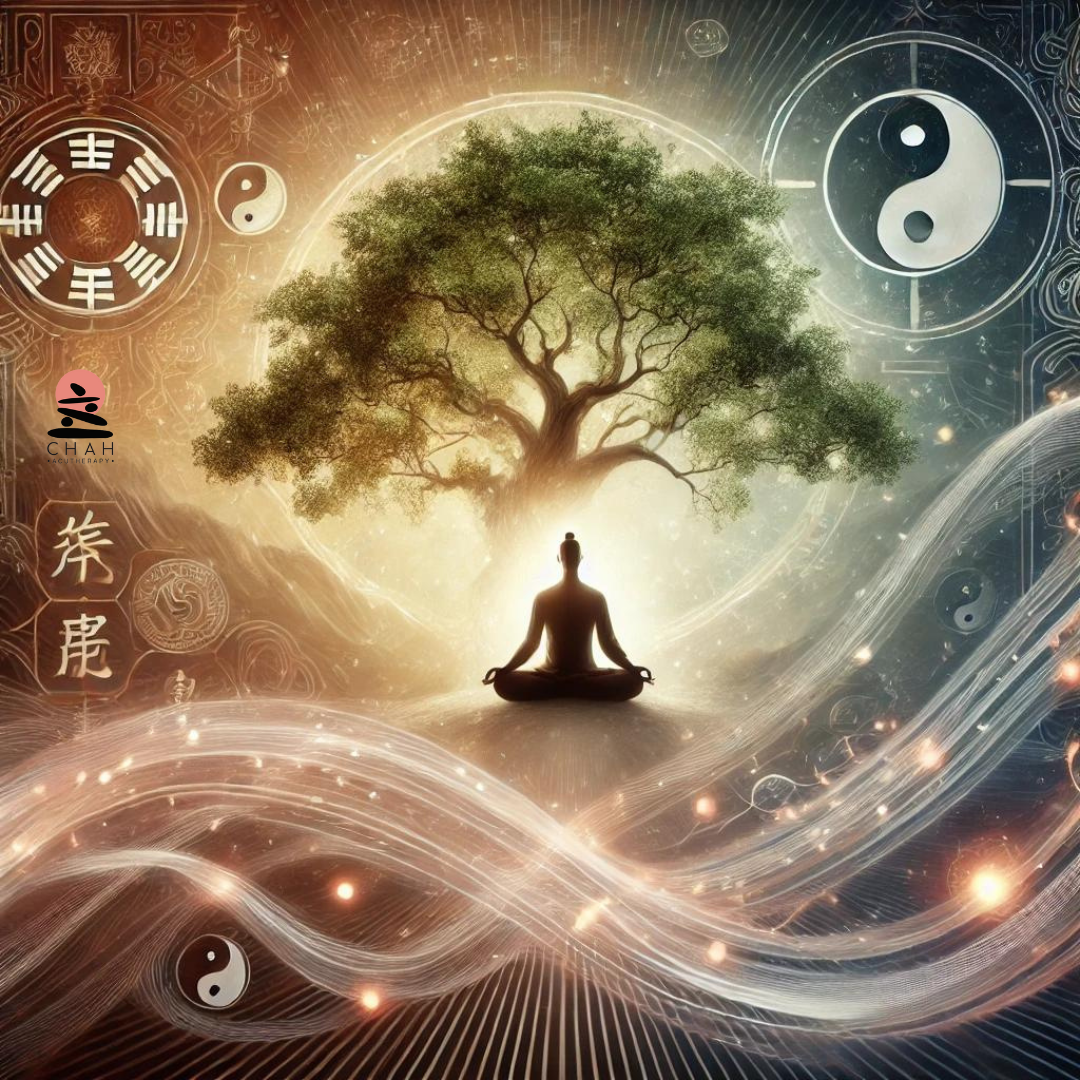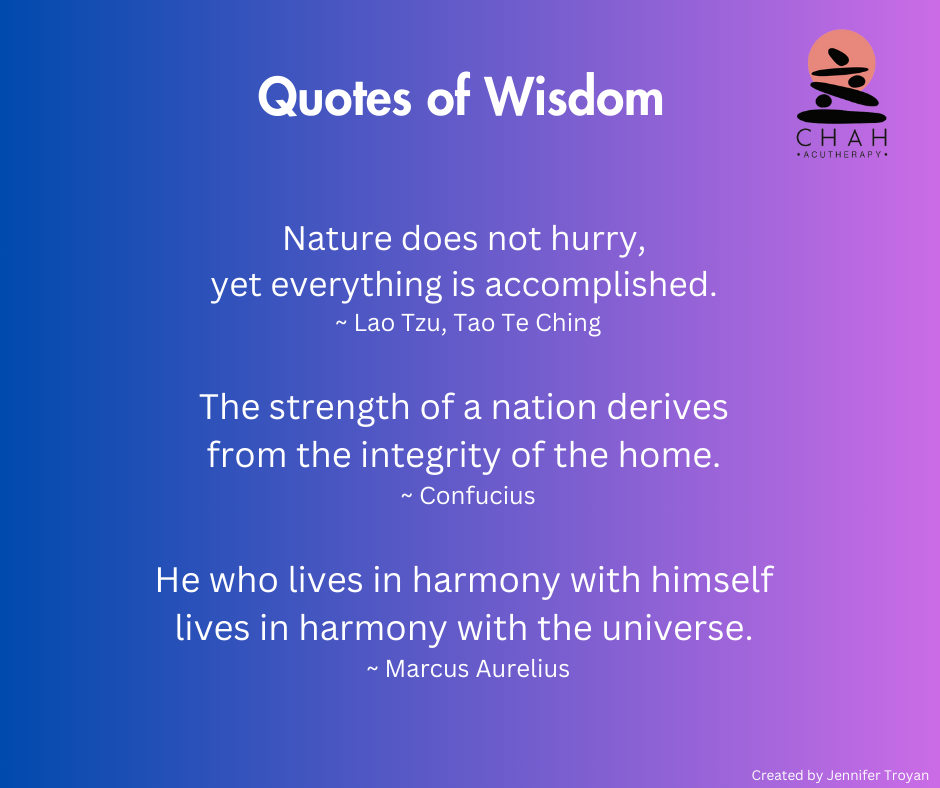 Image generated by ChatGPT
Image generated by ChatGPT
Falling Into Ourselves: TCM View of Spirit, Mind, & Emotions
By Maria Chah, DOM, AP & Jennifer Troyan
Part 1 of 2
In the ancient beginnings of Traditional Chinese Medicine (TCM), the Sage masters and scholars stated, in order to understand the medicinal benefits of Acupuncture and Chinese Herbs, one must first explore the concept of the mind and spirit. TCM is not only a practice that treats physical ailments, it also views human health as a harmonious balance of interconnected forces and its inclusion of the environment, philosophy, spirituality, the mind, and physical body. In our modern society, this ancient model of thought and its application continues to thrive. It is the most utilized medicine in the world not only because of its historic documented empirical studies but equally because of how well it honors the body’s innate wisdom. The wisdom of the body is also recognized as a continuous living energy that encompasses and generates aspects of itself in conjunction with the external and internal stressors humanity endures.
This blog is a two part series that explores the key philosophical influences behind TCM, particularly how Taoism and Confucianism shaped its understanding of health, spirituality, and the role of the individual within society. By examining concepts like Qi (life force), Yin and Yang, The Five Elements, and the Shen (spirit), we can better understand a window view of TCM's evolution and how it connects the physical and spiritual selves.
Taoism, Confucianism, and Their Influence on Traditional Chinese Medicine (TCM)
Taoism and the Spiritual Self
Taoism focuses on the individual as a spiritual being. The Tao (pronounced “dow”), translated as "the way," emphasizes alignment with nature and the cosmos. Taoist philosophy teaches that human beings are part of a larger natural order and should live in harmony with nature's circadian rhythms. These ideas became foundational to Chinese medicine, especially in balancing the human life force called “Qi” within the body through Yin and Yang principles.
In Taoist-inspired TCM, the spiritual self is central to health. Concepts of benevolence, humility, and compassion are seen as vital aspects of one's spiritual essence, a reflection of the Tao. Acupuncture points are selected based on their connection to these spiritual qualities, echoing the idea that health is both physical and spiritual.
Confucianism and the Social Self
Confucianism emphasizes the individual's social self. The philosophy focuses on the roles one plays in society and how adhering to those roles contributes to personal and societal harmony. This focus extends to Chinese medicine, where emotions and social interactions are vital in diagnosing and treating health issues. The influence of Confucianism is evident in how TCM incorporates the psyche into treatments. In TCM, emotional well-being is intertwined with physical health, which is why mental states like stress or grief are considered significant in diagnoses.
Incorporating Shen, Hun, Po, Yi, and Zhi into TCM’s Holistic Framework
The Shen (spirit) is central to TCM’s understanding of mental and emotional health. According to Chinese medicine's psychological culture, “there is no separation of body from mind, spirit, and soul.” The Shen is part of the Heart's Yin energy and governs consciousness, thoughts, and emotions. Without understanding the heart (Shen) spirit of one’s Soul, one cannot fully bring about balance of the mind and body.
In addition to the Shen, each major organ in TCM has an associated spirit:
- Hun (Ethereal Soul) of the Liver influences creativity, planning, and dreams.
- Po (Corporeal Soul) of the Lungs governs instinctual and physical sensations.
- Yi (Intellect) of the Spleen represents analytical thinking and memory.
- Zhi (Willpower) of the Kidneys is linked to determination and endurance.
These aspects are integral to understanding how TCM addresses not only physical ailments but also the emotional and spiritual attribution of these ailments that affect well-being. An imbalance in any of these spirits' natural flow of Qi can lead to physical and emotional disharmony. The discourse of the energy generally is signaled throughout the body’s meridian channels expressed as deficient or excess energy, feelings, or pain.
The Yin-Yang Balance and Qi
In TCM, the balance between Yin and Yang, as well as the flow of Qi, is critical for health. Yin represents solid form, inward calm and passive energy, while Yang represents non-solid form, up and outward activity and dynamism. Together, they create a holistic balance. The Shen, along with the other spirits of the organs, follows the principles of Yin and Yang. Each organ spirit, being a form of Yin, interacts with the more energetic Yang forces of the body, such as the movement of Qi, blood and fluids. Together, Yin is the carriage in which blood is contained and Yang is the energy that ignites and moves the carriage to its innate destination. The Shen (spirit mind) is the interdependence of Yin and Yang, therefore, creating harmony or disturbances that manifest as positive or negative emotional and/or physical symptoms and vice versa.
All of which are beings of the substantial material matter of Yin that encompasses the non-material energy aspect of the Yang Spirit. Hence, Shen exist in the laws and principles of YIN & YANG theory that states:
- Oppositional
- Interdependent
- Mutual Consumption
- Inter Transformation

Image generated by Canva AI
The Role of the Five Elements
Confucian and Taoist philosophies both inform the theory of the five elements in TCM: Wood, Fire, Earth, Metal, and Water. Each element corresponds to an organ system and its spirit. The Shen, associated with the heart and the Fire element, plays a crucial role in maintaining emotional stability and mental clarity. Similarly, the Hun (Wood), Po (Metal), Yi (Earth), and Zhi (Water) all contribute to a balanced life force, with each element influencing different emotional and physical states. Each organ of the body stores and generates emotional and physical energy that is vital in feeding and eliminating new and old life force. When the body becomes stagnant, fatigued, stressed and/or dis-eased, usually due to suppressed emotions, poor nutritional and physical care, the role of understanding the five elements helps the Acupuncturist identify specific types of disharmony interfering with the body's natural systemic functionality.
No Separation of Body and Spirit
One of the most profound teachings in TCM is that there is no separation between the body and the spirit. That all parts contribute to a whole and that Yin and Yang is the one thing in relation to another generated from the philosophical concept that all things have some amount of everything. Shen, Hun, Po, Yi, and Zhi are not mere metaphors but real influences that TCM practitioners address when treating the body. Whether through acupuncture, herbal remedies, or other therapies, the goal is always to treat the whole person-body, mind, and spirit. And this is accomplished by approaching each individual’s situation from a spectrum of what is going on in comparison to other things simultaneously happening. The main objective of TCM is to restore and maintain the natural harmony of nature which creates a constant flow of change. According to ancient texts and modern TCM scholars, “thoughts precede material objects,” and the spirit, soul, and mind are inseparable aspects of health. To identify the origin of one’s chief complaint and its counterparts of the body is also to understand the yin aspect of the person’s ailment and understand the Yang “Qi” force or lack of, that stems from the unbalanced internal Yin self.
TCM aspect of Spirit, Soul, and Mind Conclusion
The ancient philosophies of Taoism and Confucianism offer a holistic view of health that integrates the physical, mental, and spiritual aspects of the individual. Having to contemplate the complexity of the absolute nature of life has been a major part of Chinese Medicine evolution and from this perspective, TCM always views the body as a continuum of the spirit and mind and its interchangeable roles. With this holistic view, the true essence of TCM is preserved. By understanding the balance of Yin and Yang, the flow of Qi, and the role of the five elements, TCM provides a unique approach to maintaining health and harmony for the body, mind and the spirit.
We have a mental epidemic because we separate our minds and bodies, yet they are connected. By not loving our body and mind, the physical spirit begins to get ill. Surrender to the spirit. We get to love our bodies and no matter what, it’s all connected. Breath is life.

Good health to you all!
--------------------
Information in this article and on this website is intended for informational or educational purposes only. This information does not replace professional medical advice, diagnosis, or treatment. If you have questions about a medical condition, always seek the advice of a doctor or other qualified health professional.
To learn more about our services, please contact our office at 561-249-0447 for a consultation on how to start your annual wellness optimization. During the consultation, we can provide guidance on the best treatment modalities to improve or enhance your state of wellness the TCM way.
Your health team: Chah Acutherapy - We are here for you.
